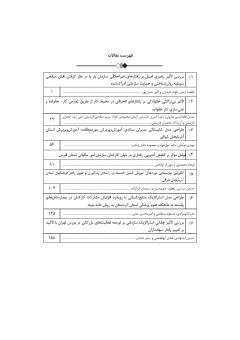الگویابی نیازسنجی دورههای آموزش ضمن خدمت فرهنگیان مطالعه موردی: فرهنگیان استان آذربایجان شرقی
محورهای موضوعی : مطالعات رفتاری در مدیریت
حسین مرسلی
1
![]() ,
یعقوب علوی متین
2
,
یعقوب علوی متین
2
![]() ,
سلیمان ایران زاده
3
,
سلیمان ایران زاده
3
![]()
1 - دانشجوی دکتری، گروه مدیریت صنعتی، واحد تبریز، دانشگاه آزاد اسلامی، تبریز، ایران
2 - دانشیار، گروه مدیریت صنعتی، واحد تبریز، دانشگاه آزاد اسلامی، تبریز، ایران
3 - استاد، گروه مدیریت صنعتی، واحد تبریز، دانشگاه آزاد اسلامی، تبریز، ایران
کلید واژه: آموزش ضمن خدمت, نیازسنجی, فرهنگیان, تحلیل مضمون, مدلسازی, SmartPls, آموزشوپرورش,
چکیده مقاله :
پژوهش حاضر باهدف طراحی الگویی بهینه برای نیازسنجی دورههای آموزش ضمن خدمت فرهنگیان استان آذربایجان شرقی انجام شده است. این پژوهش به شناسایی و اولویتبندی نیازهای آموزشی و حرفهای معلمان بهعنوان عوامل کلیدی در بهبود کیفیت آموزشی میپردازد. روش تحقیق کیفی و با تحلیل مضمون انجام شد و دادهها از طریق مصاحبههای نیمهساختاریافته با خبرگان آموزشی گردآوری و با نرمافزار MAXQDA تحلیل شدند. که در آن 9 بُعد اصلی شامل مدیریت و رهبری، مهارتی، اجتماعی، اداری و مالی، آموزشی و فرهنگی، شایستگی، تربیتی و پرورشی، دانش و تخصص، و روانشناختی در قالب الگوی نهایی طراحی شد.
طرح بحث به اولویتبندی این ابعاد میپردازد؛ نتایج نشان داد که ابعاد آموزشی و فرهنگی (18.11٪) و اداری و مالی (15.75٪) بیشترین اولویت را دارند، در حالی که بُعد مهارتی (5.12٪) کمترین اولویت را داراست. مدل نهایی به عنوان چارچوبی عملی برای بهبود برنامهریزی و اثربخشی دورههای آموزش ضمن خدمت معلمان قابل استفاده است.
This study aimed to design an optimal model for assessing the training needs of in-service education programs for teachers in East Azerbaijan Province. The research focuses on identifying and prioritizing the professional and educational needs of teachers, which are considered critical factors in improving the quality of education. A qualitative research method was employed using thematic analysis, with data gathered through semi-structured interviews conducted with educational experts. The analysis was carried out using MAXQDA software to extract meaningful themes and dimensions.
The final model, developed using SmartPLS software, encompasses nine key dimensions: management and leadership, skills, social, administrative and financial, educational and cultural, competency, training and nurturing, knowledge and expertise, and psychological aspects.
The prioritization of these dimensions indicated that the educational and cultural dimension (18.11%) and the administrative and financial dimension (15.75%) were the most critical, while the skill dimension (5.12%) had the lowest priority. The proposed framework offers practical insights for planners and policymakers to enhance the planning, implementation, and overall effectiveness of in-service teacher training programs.


